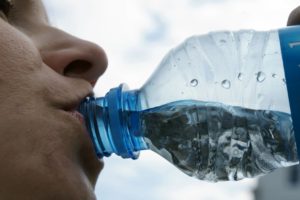 As summer temperatures soar, so does your risk of dehydration. Thirst is often your body’s first cue that you’re low on water. “You’re already dehydrated by the time you’re thirsty, at least mildly, if not more,” says Matthew Ganio, Ph.D., director of the Human Performance Lab at the University of Arkansas.
As summer temperatures soar, so does your risk of dehydration. Thirst is often your body’s first cue that you’re low on water. “You’re already dehydrated by the time you’re thirsty, at least mildly, if not more,” says Matthew Ganio, Ph.D., director of the Human Performance Lab at the University of Arkansas.
People of all ages and activity levels can become dehydrated; however, those who participate in endurance events or work in the heat or high altitude are at higher risk, as well as diabetics, children and the elderly.
 Symptoms of mild to moderate dehydration include dry mouth and skin, headache and decreased sweat and urine output. According to two University of Connecticut studies, mild dehydration can also cause fatigue, anxiety and reduced concentration. Severe dehydration is life-threatening and may result in fever, rapid heart rate, confusion, vomiting or seizures.
Symptoms of mild to moderate dehydration include dry mouth and skin, headache and decreased sweat and urine output. According to two University of Connecticut studies, mild dehydration can also cause fatigue, anxiety and reduced concentration. Severe dehydration is life-threatening and may result in fever, rapid heart rate, confusion, vomiting or seizures.
Monitoring the color of your urine can provide a general idea of your hydration level. “The goal is pale yellow urine, like the color of lemonade,” says Ganio. As urine gets darker, it usually indicates more dehydration, but be aware that certain foods and medications can affect its color.
The most common advice is to drink eight cups of water a day, but this number may not be accurate for people of all ages and sizes. “It’s a good starting point,” says Ganio, “But there’s not good scientific evidence for that to be a true measure of how much you need.”
The amount of water you need can fluctuate daily depending on your activity level, weight, diet and the environmental temperature. On average, 20 percent of your daily fluid intake comes from food. Beverages such as juice, tea and soda also count toward your water intake.
The latest research shows that moderate amounts of caffeine – the equivalent of two to three cups of coffee – do not hinder hydration and are used regularly by athletes to enhance sports performance. Alcohol is a powerful diuretic, so if you’re trying to stay hydrated, it’s best to skip the cocktail.
When participating in prolonged endurance activities, drinking a sports beverage with added sodium and electrolytes may help you retain fluids and rehydrate faster. Coconut water is a popular alternative to sports drinks and provides a relatively low-calorie way to get more potassium in your diet with less sodium and sugar than most sports drinks.
Being chronically dehydrated may put you at higher risk for kidney stones, gallstones, urinary tract infections or even bladder or colon cancer, but Ganio says more research is needed.
Did You Know?
Drinking too much water over a short period of time can cause a rare but deadly condition called hyponatremia. People working in the heat or participating in long endurance events are at increased risk. Weighing yourself before and after exercise can help you gauge how much fluids you need to drink.